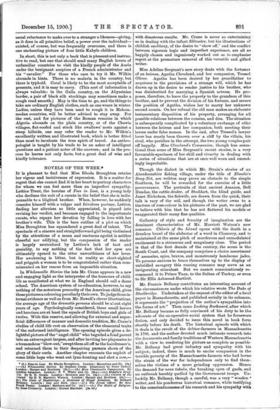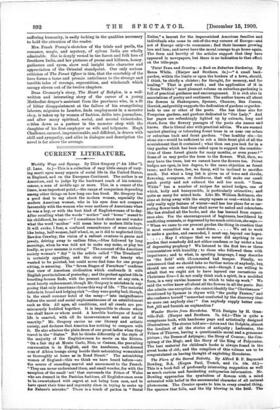NOVELS OF THE WEEK.*
IT is pleasant to find that Miss Rhoda Broughton retains her vigour and incisiveness of expression. It is a matter for regret that she cannot find it in her heart to portray characters for whom we can feel more than an imperfect sympathy. Lettice Trent, the heroine of Foes in Law, is a young lady who declines the suit of a curate in the belief that she is indis- pensable to a blighted brother. When, however, he suddenly consoles himself with a vulgar and frivolous partner, Lettice, finding her altruism so little appreciated, is piqued into revising her verdict, and becomes engaged to the importunate curate, who repays• her devotion by falling in love with her brother's wife. This is the bare outline of a plot on which Miss Broughton has squandered a great deal of talent. The spectacle of a sincere and straightforward girl being victimised by the attentions of a mean and unctuous egotist is neither cheerful nor edifying, but the compassion of the reader is largely neutralised by Lettice's lack of tact and geniality, to say nothing of the fact that her eyes are ultimately opened to the utter unworthiness of her lover. Her awakening is bitter, but in reality so short-sighted and priggish a woman is to be congratulated rather than com- miserated on her rescue from an impossible situation.
In Whilomville Stories the late Mr. Crane appears in a new and engaging light as the interpreter of the humours of child- life as manifested at what we in England should call a dame school. The American system of co-education, however, to say nothing of the notorious precocity of the American child, gives these pictures a colouring peculiarly their own. To judge from in- ternal evidence as well as from Mr. Newell's clever illustrations, the average age of the dramatis persona should be a!-,out eight years of age. Psychologically considered, these small heroes and heroines are at least the equals of British boys and girls of twelve. With this reserve, and allowing for external and super- ficial differences of manner and domestic tradition, Mr. Crane's studies of child life rest on observation of the elemental traits of the unformed intelligence. The opening episode gives a de- lightful picture of the "angel child" who beguiled a fond parent into an extravagant largess, and after inviting her playmates to a tremendous " blow-out," swept them all off to the hairdresser's, and returned them to their despairing parents shorn of the glory of their curls. Another chapter recounts the exploit of some little boys who went out lynx-hunting and shot a cow,— * (L) Jibes fn Law. By Rhoda Broughton. London : Macmillan and Co. [6s.] —(2.) Whilomville Stories. By Stephen Crane. Illustrated by Peter Newell. London : Harper and Brothers. [3s.]—(3.) Miss Cleveland's Companion. By Adeline Sergeant. London : F. V. White and Co. [66.]—(4.) Elm/flies Drag- Net. By E. H. Strain. London : Methuen and Co. (6a]—(5.) Chloris of the (stand. By H. B. Marriott Watson. London : Harper and Brothers. [6x)- (6.) The Duke of Stockbridge : a Romance of Shays' Rebellion. By Edward Bellamy. London : Gay and Bird. [Ge.]—(7.) The Forest Officer. By Mrs. Frank Penny. London : Methuen and Co. (6s.]—(8.) The Heart of Babylon. By Dews Cromarty. London : Horace Marshall. [3e. 6d.] with disastrous results. Mr. Crane is never so entertaining as in dealing with the infant filibuster, but his illustrations of ' childish snobbery, of the desire to "show off," and the conflict between rigorous logic and imperfect experience, are all so happily chosen and ingeniously worked out as to emphasise regret at the premature removal of this versatile and gifted writer.
Miss Adeline Sergeant's new story deals with the fortunes of an heiress, Agatha Cleveland, and her companion, Tressel Oliver. Agatha has been desired by her grandfather to acquiesce in the provisions of a strange will, which he has drawn up in the desire to render justice to his brother, who was disinherited for marrying a Spanish actress. He pro- poses, therefore, to leave the property to the grandson of this brother, and to prevent the division of his fortune, and secure the position of Agatha, wishes her to marry her unknown second cousin. On her refusal the old man makes an elaborate testamentary disposition of his property, arranging for all possible relations between the cousins, and dies. The situation is subsequently complicated by a voluntary exchange of roles between the heiress and her companion, both meeting their lovers under false names. In the end, after Tresses lawyer lover has nearly been thrown over a cliff by the villain, his rival, who perishes in the attempt, the two young couples pair off happily. Miss Cleveland's Companion, though less sensa- tional than some of Miss Sergeant's recent stories, is a very favourable epecimen of her skill and vivacity in dealing with a series of situations that are at once well worn and exceed- ingly improbable.
Though the dialect in which Mr. Strain's stories of an Aberdeenshire fishing village, under the title of Elmslie's Drag-Net, are written may prove an obstacle to the simple Southron, he will be rewarded for the exercise of a little perseverance. The portraits of that ancient Amazon, Bell Dundas, the cattle-dealer, of Stoddart, the blind guide, and Janet Nicholson, the fishwife, are drawn from the quick, their talk is racy of the soil, and though the writer owns to a. tincture of rose-colour in his pictures of the past, we are glad to believe with him that he has not flattered his models or exaggerated their many fine qualities.
Gallantry of style and ferocity of imagination are the dominant characteristics of Mr. Marriott Watson's new romance. Clitoris of the Island opens with the death in a drunken brawl of the abductor of a ward in Chancery, and is maintained at the same pitch of murderous and unmodulated excitement to a strenuous and sanguinary close. The period is that of the first decade of the century, the scene is the South Coast, and the company comprises a choice assortment of assassins, spies, bravos, and monstrously handsome jades. To persons anxious to brace themselves up to the display of unbridled savagery this roaring romance may serve as an invigorating stimulant. But we cannot conscientiously re- commend it to Prince Tuan, to the Sultan of Turkey, or even to Sir Ellis Ashmead-Bartlett.
Mr. Francis Bellamy contributes an interesting account of the circumstances under which his relative wrote The Duke of Stockbridge. Undertaken at the request of the editor of a local paper in Massachusetts, and published serially in its columns, it represents the "projection of the author's sympathies into the forms of art." Then came Looking Backward, after which Mr. Bellamy became so fully convinced of his duty to be the advocate of the co-operative social system that he foreswore fiction, and only decided to issue this novel in book form shortly before his death. The historical episode with which it deals is the revolt of the debtor-farmers in Massachusetts in 1786, and the author devoted much intimate research into the documents and family traditions of Western Massachusetts with a view to rendering his picture as complete as possible. Mr. Bellamy had great industry and sympathy with his subject; indeed, there is much to excite compassion in the terrible poverty of the Massachusetts farmers who had borne the strain of the war for independence only to find them- selves the victims of a more grinding oppression. Hence the demand for nom tabula', the breaking open of gaols, and an outbreak harshly quelled by the Government troops. Un- luckily Mr. Bellamy, though a careful, was a very " wooden * writer, and his ponderous historical romance, while testifying to the conscientiousness of his research and his sympathy with
suffering humanity, is sadly lacking in the qualities necessary to hold the attention of the reader.
Mrs. Frank Penny's sketches of the trials and perils, the romance, magic, and mystery, of sylvan India are wholly admirable. She is deeply versed in the forest and folk lore of Southern India, and her pictures of peons and hillmen, honey- gatherers and syces, show real insight into character and appreciation of the Oriental standpoint. Our only serious criticism of The Forest Officer is this, that the courtship of the hero forms a tame and prosaic anticlimax to the strange and terrible tales of revenge, superstition, and witchcraft which occupy eleven out of its twelve chapters.
Dees Cromarty's story, The Heart of Babylon, is a well- written and interesting story of the career of a young Methodist draper's assistant from the provinces who, in a fit of bitter disappointment at the failure of his evangelising labours, migrates to London, finds employment in a monster shop, is taken up by women of fashion, drifts into journalism, and after many spiritual, social, and mental vicissitudes, settles down as a partner in the monster shop with the daughter of his first employer as wife and helpmate. Hugh Challoner, earnest, impressionable, and diffident, is drawn with skill and sympathy, and alike in dialogue and description the novel is far above the average.















































 Previous page
Previous page